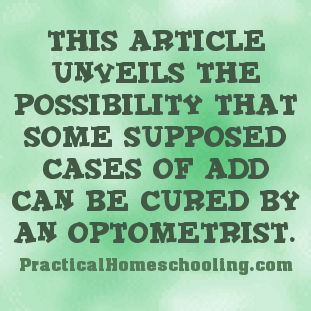Vision or ADD?
By Lisa Gard
Printed in Practical Homeschooling #72, 2006.
 Lisa Gard unveils the possibility that some supposed cases of ADD can be cured by an optometrist.
Lisa Gard unveils the possibility that some supposed cases of ADD can be cured by an optometrist.

|
 |
 Not keeping on task or easily distracted. Careless mistakes with school work. Squirming while seated. Whining, crying or angry outbursts when asked to read or write.
Not keeping on task or easily distracted. Careless mistakes with school work. Squirming while seated. Whining, crying or angry outbursts when asked to read or write.
These are classic symptoms of ADD or ADHD, right?
Well, not necessarily.
According to the College of Optometrists in Vision Development (COVD) these and other symptoms such as mixing up small words or skipping lines, rubbing eyes, yawning and even falling asleep when reading are found in children who have vision problems.
Eye turns (strabismus, with eyes not pointing in the same direction) may be easy to spot but what about children who have nearsightedness (myopia), farsightedness (hyperopia), or lazy eye (amblyopia)?
As a vision therapist working for a behavioral optometrist I spent many hours with suspected ADD patients watching them improve with vision therapy. Some parents saw a significant improvement with a new lens prescription alone.
If the child had ADD why did the symptoms improve with lenses and therapy? The answer is the child did not have ADD. The child's problem was vision-related.
You may say "My child doesn't have vision problems. He sees 20/20." The 20/20 scale only measures how well your child sees at 20 feet. It will not measure how well the eyes see at reading and writing distance, how well the eyes work together (eye teaming), or if your child can focus his eyes on the page long enough to read or write (convergence). An inability to efficiently do any of these tasks may produce behaviors that mimic ADD.
Vision is the most efficient way to gain information into the human brain. Can you tell how far away something is, how heavy or light, smooth or rough an object is with any other sense? You may be able to but you'd have to lift it, touch it and measure it to find out the same information you can get from a quick glance if your visual system is working correctly. Imagine if you saw double for just an instant whenever you had to read or do a workbook page. Your eyes would be working so hard just to keep images clear and single that you'd never get any information from the written word.
Are any of your children auditory, tactual or kinesthetic learners? When your child is experiencing visual difficulties they may have to fall back on other senses in order to make up for what the eyes can not perceive accurately or efficiently.
What if you suspect your child may have visual issues? Where do you go for help? First you find a behavior optometrist. These optometrists are trained to provide lenses for your child and many provide vision therapy or vision training. The College of Optometrists in Vision Development (COVD) is a good place to start. Check them out on the web at www.covd.org or 1-888-268-3770. You can also check out Parents Active for Vision Education (P.A.V.E.) at www.pavevision.org or 1-800-PAVE-988 for more information on local support groups and behavioral optometrists.